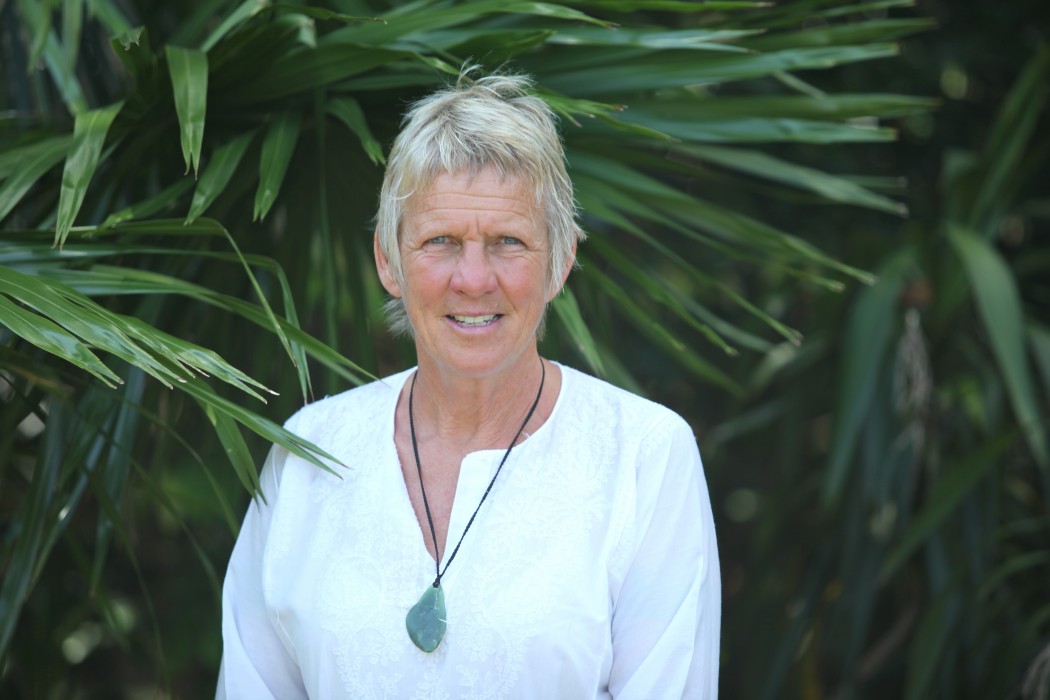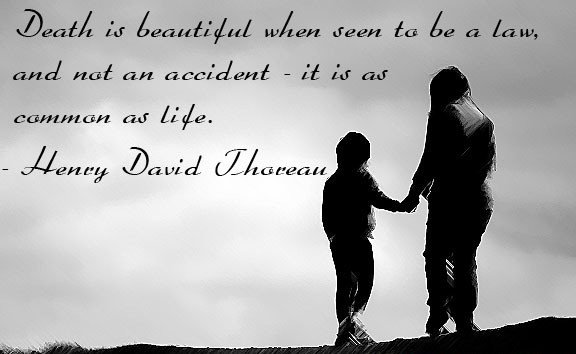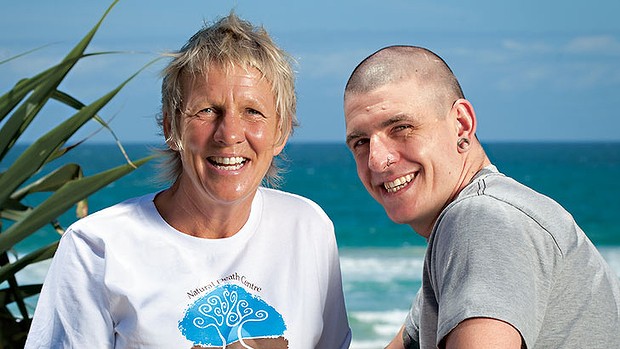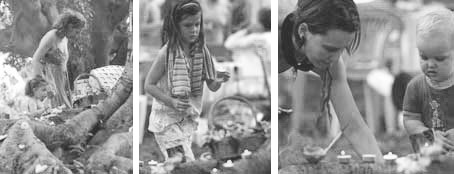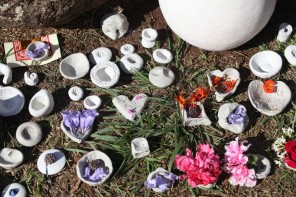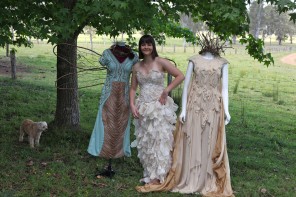To celebrate the Day of the Dead, the living, under the extraordinary guidance of Deathwalker Zenith Virago, will be gathering at the Crystal Castle on Sunday November 9 for a community event. Candida Baker spoke to Virago about her life’s work in death.
Death, according to Zenith Virago, holds the key to life. And she should know.
Virago has been working with death and the dying for over twenty years now and during the past few years, she has, she says, reached an ever deeper understanding of her role on the planet as a ‘Deathwalker’.
“I made a decision last year that I would give up doing commercial weddings,” she says. “I did a vision quest in the US to look at what was the most useful way for me to be in the world and what came out of it was to take my death work even deeper.”
As the founder of the Natural Death Care Centre (https://www.naturaldeathcarecentre.org/) over the years Virago has helped hundreds of people to cope with the process of their own, or a loved one’s death and dying, but it seemed to her that the time had now come to share her knowledge with other Deathwalkers – in order that an increasing number of communities could have someone trained to walk the whole journey from illness to death.
“What I’ve realised in my work is that the best use of my time with the Death Care Centre, is to put the focus on educating people about death before there’s a need for it,” she says. “My aim is that there could be a person like me in every community who is resourced to travel that whole journey from illness, to palliative care, to death and dying and ceremony. In a sense it’s the position a midwife holds for birth – someone who is there to hold the process for everybody.”
We’re talking in the beautiful garden overlooking stunning views to the coast from her home in Tyagarah, ten minutes from Byron Bay – the town that drew her like a magnet when she was travelling in her early twenties.
“I’d left my life and family in the UK, and I’d been travelling through Europe and New Zealand, and then I came to Australia,” Virago says. “I was hitching from Sydney to Cairns and a guy who had picked me up in Grafton said to me that I ought to see Byron, so we drove in there at 8.00 am and the ocean was like glass. I thought to myself that’d I’d never seen anything as beautiful.”
Virago carried on with her journey, but somewhere in the back of her mind was the idea that she would come to live in Byron. There was, already, an inkling of her future direction. “I’d had a pretty normal life in England,” she says, “but when I was 14 my best friend had died, and ever since that time I’d lived with this idea that you could die at any time. It wasn’t that this scared me, more that it intrigued me, and I carried it with me all the time.”
All these years later she still occasionally wonders about the path that brought her to Byron and to her work. “It’s so much a chicken and egg situation,” she says. “Was it an inevitable path, or did I make it happen? It’s the constant mystery. Then some time later I chose to have a child with a close friend to have a baby for him to raise, and he lived just out of Byron, so while I was pregnant I came to live at Wategos, and Tane was born. I did a lot of travelling during his childhood and I saw them whenever I wanted to and Tane came to see me when he wanted, but we didn’t co-parent because that wasn’t the agreement.” But death made its presence felt again when Tane’s father died when he was 13, and Virago suddenly became a full-time parent. “It was a big shift for both of us,” she says. “But I am so blessed because he’s now married and I have a beautiful daughter-in-law and five-year-old grand-daughter.”
The pivotal moment for Virago was when she was working as a paralegal in Byron when her best friend Sylvia died suddenly of a massive brain haemorrhage. Virago was sitting with Sylvia’s body in the morgue, stroking her friend’s head, when she suddenly experienced an energy release, witnessing a column of energy leaving from the crown of her friend’s head. Determined to do Sylvia and her family justice Virago decided to use her legal skills to organise the building of a coffin, all the legal paperwork and certificates, so there could be a vigil at home and an open coffin, and to undertake the funeral herself. With the aid of a supportive funeral director she managed all it, and the experience propelled her closer towards an understanding that her life’s work was in death.
“I don’t offer the idea of the spirit living beyond the body,” she says. “With Sylvia it happened, but it’s not part of the work I do. It’s the story of my life. Life offers something to me in a really big way one time and I take it on board. I’m certainly not about putting forward any beliefs, and that’s something we teach in the training. We simply open ourselves to listening and talking, it’s as simple as that.”
But whilst that sounds simple it’s not given to everyone to be able to stand as clear and strong as Virago. For the many of us who have been touched by her work over the years, or who know her personally she comes across, with her piercing blue eyes, and obvious inner strength and calm, as someone who not only accepts but welcomes the thin veil between life and death. For Virago the anual Day of the Dead, is a celebration of that veil. Perhaps not yet fully accepted as an Australian tradition, many cultures around the world set aside a day for honouring and remembering the dead. In Mexico, the Dia de Muertos evolved from an ancient Aztec festival celebrating the deity, Mictecacihuatl, Queen of the Underworld, the dates coinciding with the European tradition of Allhallowtide which encompasses All Hallows’ Eve (Halloween), All Saints’ Day and All Souls’ Day.
The Deathwalker trainings cover such subjects as preparation for dying, advocacy, caring for or being with the dying, arranging the funeral, taking care of the body, and the final ceremony. Virago sees death as a great teacher. “It teaches people so much about how they want to live,” she says. “I see incredible things, no matter at what stage people are at when they embrace the idea of death, the immanence and the reality of it, it frees something up in them to live fully, even if it’s only for their last month on earth, or if it’s for their last 50 years.”
Part of the gift her work has given her personally is an enviable lack of fear around dying. “The only thing I’m concerned about is that I don’t want to miss my death,” she says. “I think fear of death is very limiting and you have to brush away what it’s covering up. Some people are afraid of pain, or of leaving their children, or the unknown or because they won’t be in control – some are afraid of all those things. You have to get them to break it down because really all of those amount to the same as being afraid of living.”
Dying, she says is an internal and external experience. “And so is life, which people can obviously acknowledge, but it’s much more difficult around death.”
Another reason to have Deathwalkers to help support people is that some deaths are harder to come to terms with than others. “There are a lot of emotionally complicated deaths,” she says. “Children, those that end their own lives, still-born babies, when the bodies are not there because they’ve been lost at sea or buried in avalanche, or it’s been a brutal death, it’s obvious to me people who are going through these things need support. I think that once there would have been support for them, but gradually we’ve become so detached from death that the idea of being actively involved in it in some way has become strange, when it should be natural.”
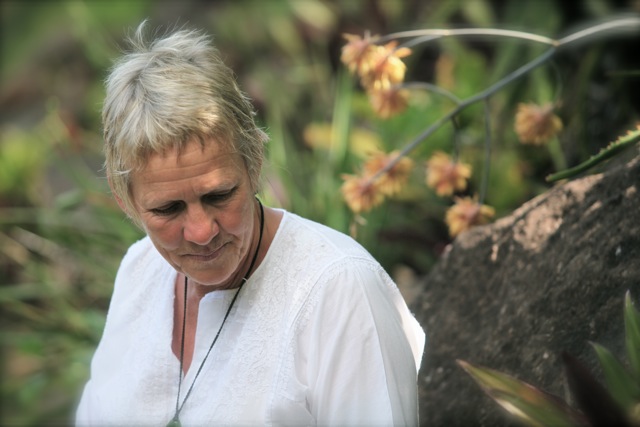
“I hope my friends say we’re sad she’s gone and we miss her but wow, she certainly lived that life.”
One of the many initiatives of the Natural Death Care Centre some years ago was to get people to design their own coffins – the cheerful crazy results of which found their way into various magazines, and certainly opened a window for many of us on the very idea that we could perhaps have say in our death. It’s been a long journey for Virago building up the Centre and basically running it as a one-person job but as synchronicity would have it, once she’d decided to stop doing commercial weddings the Vasudhara Foundation, a small philanthropic foundation, approached her.
“It’s really unheard of,” she says, even now smiling at the idea of it. “Someone rings you up out of the blue and says we’d like to support you with seed funding, and from that came the idea of formalizing the Deathwalker trainings into workshops, so that we could focus on death education.”
I wonder what she might want her friends to say about her when she’s gone?
“I’m in love with the mystery of death,” she says, as if she’s talking about the most beautiful thing in the world (and perhaps she is). “When you’re in love with the mystery it’s almost impossible to be fearful. I hope that when I die my friends will say, we’re sad she’s gone and we miss her, but wow, she certainly lived that life.”
Personally I think there’s absolutely no doubt about that.
The Crystal Castle will be hosting the 9th Natural Death Care Centre Day of the Dead event in the Shambhala Gardens. The Crystal Castle will be offering free entry from 3.30 pm for the event which will include art, memento-making, message writing, a ceremony of remembrance at 5.00pm with Zenith Virago, and a candle light procession.

